YOUNG OPINIONS
“Switzerland needs to relax its hiring criteria for non-European scientists”.
Rita Sarkis is originally from Lebanon. She is a specialist in AI for tumour diagnosis and points to the obstacles faced by non-European scientists in Switzerland.

Rita Sarkis works in digital pathology and spatial transcriptomics at the CHUV Institute of Pathology. Until 2023, she was the president of the EPFL’s temporary staff association. | Illustration: Stefan Vecsey
In my research, we develop artificial intelligence and cell and tissue imaging tools to improve tumour diagnosis. This sector requires highly specialised, rare expertise. As a scientist from Lebanon, a non-EU and non-EFTA country, working in Switzerland is a valuable opportunity, but fraught with pitfalls, even after an academic career in a federal institution.
My work permit is tied to my employer, making every professional transition uncertain. Beyond the qualifications required, you have to navigate the complex bureaucracy that means every career move is a real challenge. While research institutes are more inclined to recruit scientists from outside Europe, hospitals, despite being at the cutting edge of research and precision medicine, are reluctant to take on the paperwork. For employers, proving that no Swiss or European candidate can fill the position is a long and dissuasive process.
Beyond the formal barriers, being a researcher from a non-European country in Switzerland also means working under constant pressure linked to this status. Administrative insecurity is accompanied by a latent feeling of discrimination, reinforced by the attitude of certain HR and administrative departments. All too often, we are reminded that our situation represents an “extra effort” for the institution, as if our presence were a favour rather than our legitimate contribution.
Restrictions in Switzerland on researchers from non-European countries prevent the labour market from directing them towards companies that need their skills. And this creates inequality of opportunity. Faced with these obstacles, several of my former colleagues have given up on pursuing their careers here, despite the scientific opportunities. These regulations, which are ill-adapted to the real needs of the sector, limit diversity, slow down innovation and make it more difficult to integrate technological advances into hospital settings. If Switzerland wants to remain a competitive centre of excellence, it needs to relax its recruitment criteria for scientists from outside Europe.




